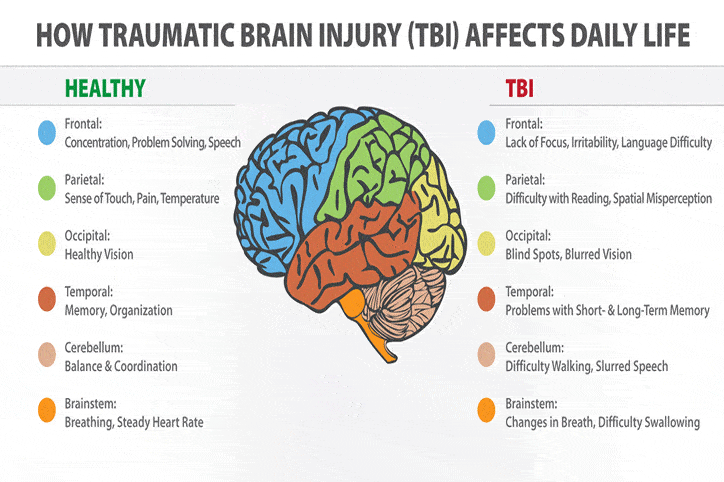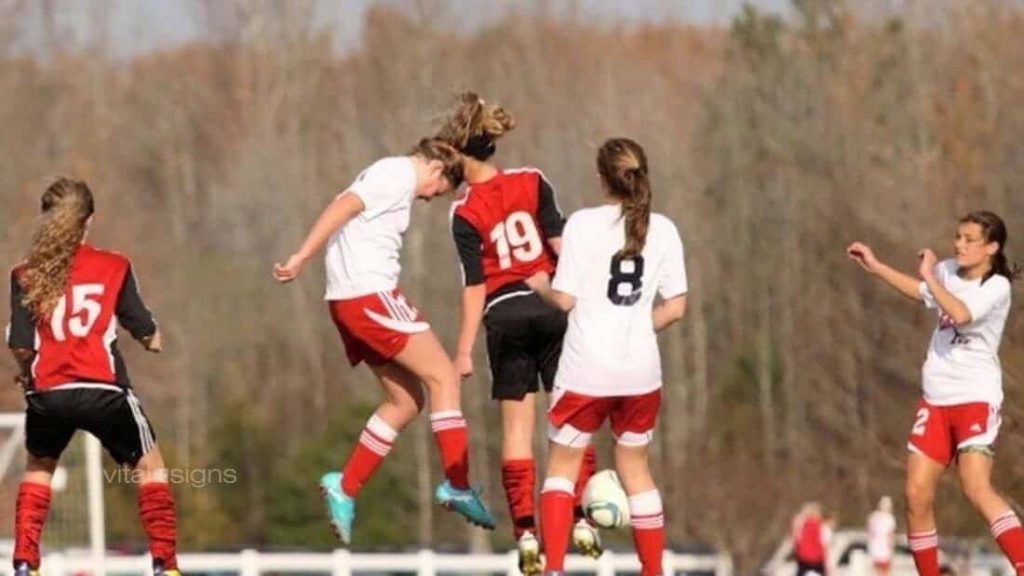Concussion (Traumatic Brain Injury)
-
What is Concussion?
-
Do Kids Have Concussion
-
Symptoms of Concussion
-
Different Types of Concussion
-
What to Do in Case of Concussion?
-
How to Prevent Concussion?
The concussion is among the most common but least serious brain injuries involving traumatic conditions. The term “Concussion” is from the “Concutere” which has a Latin origin and it refers to “Shake Violently.”
According to CDC reports, more than 73,285 people were diagnosed with a concussion at the emergency rooms between 2001 and 2009. Interestingly, most of these cases were linked to sports and recreational activities. Other type cases include falls, car accidents, fighting, work-based injuries, and bicycle accidents. How to describe if you are attacked by Traumatic Brain Injury? Is it dangerous? And what to do in case of concussion attack? You will find following answers helpful in this matter.
What is Concussion?
Have you seen the cartoon in the morning? The characters get a sudden or direct blow to the head. A Brain Injury is just like a bump or direct blow to the head. Going deep would help to understand the nature of the damage. Our brain is a structure with so many delicate tissues. These tissues are soft and thin. The brain is encased in the skull which is a protective shell. Spinal fluid is also present around to protect these soft tissues. During a concussion, the brain gets a jolt because of the sudden impact. In some cases, this sudden impact causes the brain to move around in the skull. This is the beginning of a traumatic brain injury. This may cause swelling, bruising and blood clotting inside the brain. It also damaged the brain nerves causing an interruption in spinal messages or transmission.
Do Kids Have Concussion?
The concussion is common among the young children as their heads are larger than the remaining parts of the body. The kids experience quick weight and height gain as they grow older or enter in adolescence stage. Both factors make them vulnerable.
It is important for the parents to monitor the activities of kids if they have a concussion. Most essentially, the behavioral changes should be checked. Watch the kids closely as they won’t be able to communicate with you about their feelings just because of the injury. Don’t try to use medicines such as aspirin as it may cause more bleeding inside the brain. It would be better to bring the kids to emergency as soon as possible.

Symptoms of Concussion:
It seems difficult to diagnose. It is hard to see the injury even if you have a clear bruise or cut on the head. This is also possible that the concussion symptoms remain invisible for days or even weeks after an injury. Some signs last for short period (even for a few seconds) while some may stay for longer. Traumatic Brain Injury is fairly frequent. According to medical updates, a mild concussion is reported in every 21 seconds in the United States. However, it is essential to learn about the Traumatic Brain Injury signs and symptoms in order to take the proper treatments to heal the injury. The symptoms are different. Some signs are physical, emotional as well as mental. Remember, the following signs as these could be potential indicators of the concussion.
- Feeling dazed or confused.
- Slurred speech.
- The Headache.
- Clumsiness.
- Vomiting or nausea.
- Dizziness or other balance issues.
- Light or noise sensitivity.
- Blurred vision.
- Sluggishness.
- Ringing ears.
- Concentration issues.
- Personality or behavior changes.
- Loss of memory.
Different Types of Concussion:
As a matter of fact, the concussion is graded on the basis of its severity. These types depend on different factors such as amnesia, loss of consciousness or equilibrium. There are three grades of concussion as mentioned below.
- Grade 1 (Mild): In this case, the signs of the concussion last for only 15 minutes. However, loss of consciousness/concentration doesn’t occur in this phase.
- Grade 2 (Moderate): The symptoms will last for more than 15 minutes with no loss of consciousness/concentration.
- Grade 3 (Severe): This stage is serious as the patient may lose concentration or consciousness even for a few seconds.

What to Do in Case of Concussion?
The type of treatment for concussion heavily relies on the seriousness or severity of the injury. Most patients recover completely after a precious treatment. However, taking medical care is essential in order to protect your health from further damages. You can take the following steps to avoid further injuries.
Get medical attention/care: Only a medical expert (a physician especially neuro-physician) can decide the seriousness or severity of the injury. Based on the preliminary evaluation, the doctor will decide about the type of treatment a patient needs. The doctors usually suggest waiting until the symptoms of Traumatic Brain Injury are gone but it happens only if the concussion is grade 1 or grade 2. The patients may take several minutes, hours or even days to return to their normal activities.
Consult Doctor:
It is necessary to contact with a doctor in case of grade 3 concussions. The doctor will take observations in order to decide the treatments necessary for the effect. In most cases, the doctors ask how the injury was happened and they also make notes on symptoms experienced by patients. Physicians also ask simple questions including “what is your name?,” “What do you do?” or “Where do you live?” This type of information is used to identify the level of consciousness as well as memory.
In some cases, simple tests are used to evaluate the level of concussion. Doctors usually use two types of tests such as Reflexes and Coordination. These tests are conducted to see the functioning of the nervous system. MRI and CT Scan are also used to identify the bruising or bleeding inside the skull. This helps to conclude the level of brain injury.
Instructions for a speedy recovery are provided by the physicians if they believe that hospitalization is not necessary for the treatment. Usually, Aspirin-free drugs are recommended by the doctors to control the pain. Follow-up or regular visit to the emergency room is also suggested. A patient is required to contact a doctor within 24 or 72 hours in case of severe pain. Other treatments are as given below.
Take Rest:
If you get the concussion because of sports activity then you should stop it. Don’t go to the playground but take rest. Rest is the main key as your brain requires time for proper recovery. Don’t think about resuming the game on the same day. A coach should closely monitor the above-mentioned signs in athletes and kids after the Traumatic Brain Injury. The risk will be greater if you continue or resume sports activity after having a concussion. This could damage the nervous system. Guidelines for the patients are present at the website of the American Academy of Neurology.
Protection from Frequent Concussions:
Remember, frequent attacks of Traumatic Brain Injury are dangerous for the brain functioning. Successive concussion attacks can bring devastating impacts for the health. The dangerous impacts include swelling in the brain, short or long-term disabilities, and permanent damage to the brain or even death. Remember, you have to be careful during the treatment session. Never try to resume the previous activities until or unless your physician gives you permission. Immediately stop the activities if you feel concussion symptoms again. In case, you will need to have a detailed medical examination at the emergency room. Keep in touch with the doctor especially if you are going to resume the sports activities even after getting a clearance chit.
How to Prevent Concussion?

Remember, a concussion is dangerous as it is unexpected. It has a confusion nature. This is why it is very hard to prevent Traumatic Brain Injury. However, it doesn’t mean that there is not a precautionary measure. You can use some commonsense steps to minimize the risk of concussion or traumatic brain injury.
- Use protective gears: Do you play high risk games? Those who participate in such games (Hockey, Football, Soccer, Boxing, and Rugby) have more chances of getting a concussion. Other games such as horseback riding, skateboarding, roller blade and snowboarding are also dangerous in this matter. It would be better to use protective gears such as helmets, eye guards, mouth shields and neck pads. These gears can help to minimize the impact of injuries. Make sure that protective gears are properly fit for your head.
- Smart riding or driving: It is better to use seat-belts while driving. Follow the traffic signals and guidelines. Don’t cross the speed limits. Always stay active. Never ride or drive after drinking alcohol. If you are a professional driver (driving a loaded truck, oil tanker, and others) then you should be more careful.
- Never fight: Concussion or Traumatic brain injuries are more common in males than females. What is the reason? Actually, males are more involved in street fights than women. This is why they have a higher rate of traumatic brain injuries.

















